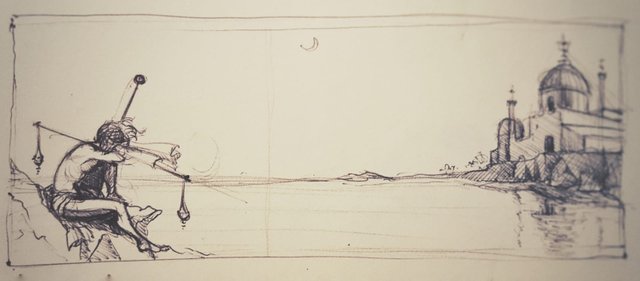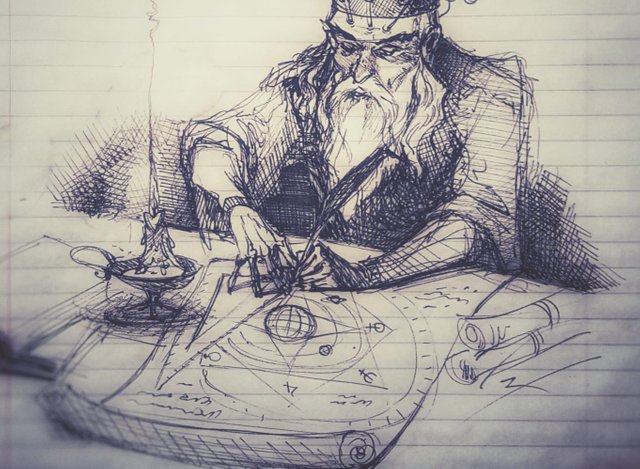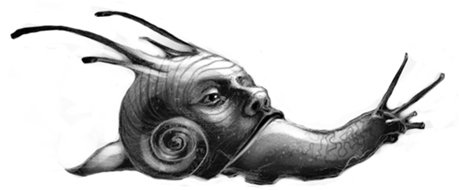How to trust Knowledge | Part 1.
.jpeg)
"Choosing to have Fate", pen on paper
Reader, beware: some slippery slope ahead.
I often wonder about how we come to hold certain ideas about how the world works or ought to work... How do we choose which believes are trustworthy and which ones should be dismissed? Why do we arrive at such polarizing conclusions about reality?
I won't pretend to be able to answer these questions with certainty, but I've attempted to analyze my own mind; to identify my thought processes and hone in on healthy skepticism, while still letting my imagination run wild. I tried to cleanse the mind from baseless biases, irrational superstitions and naive wishful thinking, all while still upholding my idealistic hopes for the future of our tribe and not falling into cynical nihilism, which strangely feels very comforting at times. So I'm here to share my understanding of the process of evaluating the 'truthiness' of ideas.
So, how do we come to trust ideas that enter our minds?
Frankly, I think that the biggest flaw in our thinking is that we tend to get emotionally attached to ideas. Somewhere between being open-minded and somewhat naive, ideas sneak into our mind and plant themselves deep in the gaps of our knowledge - making us feel enlightened, linking some missing bits, all while our confirmation bias begins to reinforce these believes by realigning what we perceive about reality to fit the desired narrative.
We don't always choose the believes we adopt (or rather what believes adopt us); By luck or misfortune of being born in a certain place and time some people are exposed to ideas through cultural conformity and become conditioned to view the world through a particular lens. They don't always even realize that there are other options, other contrasting views out there. Ideas often thrive in closed groups because groups create a barrier of tradition and rituals to protect ideas and disincentivize any inquisitive thinking. This doesn't apply to only religious indoctrination, but to any believes that thrives in tight communities.
Others accept ideas because these ideas help alleviate the pain of the Human Condition, for example: a belief in an afterlife helps alleviate the ever present fear of death (our own, and of those we love). Or for instance: the idea of Fate or submission to greater entity, gives us a sense of meaning and comfort, in light of the difficult choices and circumstances that we face throughout our lives.
Some ideas come through personal experience, which often also involves confirmation bias: A person that is susceptible to believing in alien abductions, might be more likely to spot UFOs - just like Honda Accord drivers see Honda Accords everywhere they go. Having a confirmation bias might cause some people to become more convinced in their belief based on anecdotal personal experiences.Though personal experiences can have a profound effect on the person going through the experience, their idea about what happened might be perceived from a pre-existing notion about reality.
Another way that we come to trust ideas is through imploring the virtue of Faith. When we spot inconsistencies in our believes, or contradictions of the believes with reality, we resort to Faith. This is where our idealist mind betrays our capacity for rational thinking - we think that there is a special virtue to having blind loyalty to an idea. We apply this flawed thinking not only towards supernatural believes, but also to ideas of national patriotism and even Ponzi schemes. The problem with Faith, is that while we might evoke it to justify our own believes, we ourselves rarely accept it as a credible source for any kind of knowledge when listening to others (especially if they contradicts our own believes).
Finally, we come to trust ideas after a critical examination of the evidence that supports it. The most trusted method to accepting claims or believes is with credible evidence and logical reasoning. Don't get me wrong, I'm not saying "stop being imaginative, or discovering new patterns", it's fine to be drawn to mysticism and come up with surreal propositions - that is how art is born, and I don't deny the possibility that some greater insight might be hiding amidst the motions of the planets and stars... What I'm emphasizing here are believes about reality that dictate our actions. Therefore, it is in our best interest to perceive reality as accurately as possible, and believe in as many True things as possible.
.jpeg)
"Mag", pen on paper
How to debug your own mind:
First of all we should strive to adopt a default skeptical approach, and distance our sense of 'self' to avoid confusing 'ideas/ideologies' with 'identity', since uprooting ideas that are attached to one’s identity can be psychologically and emotionally painful. By creating a mental barrier between our perceived intrinsic self and the ideas that float in our mind, we can begin to divest our ego from our ideas.
Learn to love to be proven wrong. We'd think that smart people have a built-in immunity against irrational believes, that their intelligence should keep them aware of implanted ideas. But often times their own confidence in their intelligence becomes a ripe ground for questionable ideas. Articulate people, who hold social positions should strive to re-examine their believes as often as possible. In reality though, they tend to double down to save face, and thus keep propagating the believes they hold onto others.
Therefore, adapting a mindset that we can be wrong, liberates our ego from being threatened when discovering the fallacy of our own believes.The path to objectivity : when we let go of a dearly held believe or a deeply set idea, we begin to develop our critical thinking skills and become more immune to accepting a new proposition without proper examination. Some might say that this is "close minded", but in reality we simply have implemented better filters to assess information that can at times masquerade as some kind of esoteric, 'insider' knowledge.
Not all knowledge is "Justified true belief" as Plato once described it. It is even possible to develop a whole field of academic tradition based on confirmation bias (seeing patterns that only confirm one's narrative). There are tomes upon tomes of scholarly studies about Spiritualism, Metaphysics, Astrology and many other fields of study that have no scientific backing. Yet they are considered to be 'knowledge', because they each contain valuable insight into how our mind constructs elaborate patterns from observing the natural world and ascribe supernatural-laws and agency to rule it. These teachings present a unique lens through which mystics hope to get a glimpse onto the realm of 'beyond the material' in order to learn more about the meaning of the natural world. Though these fields of knowledge have been successfully contested by science many times, they continue to thrive and play a big role many peoples' lives.
We should also try to re-examine the ideas and the believes that we already dismissed. Often times, by revisiting already rejected ideas we find parallels to the ideas we deem true and hold dear. Being exposed to as many opposing ideas as possible will inoculate our mind from a slightly mutated versions of the same idea.
White belt to black belt, and back to white.
My goal in writing this is to share what I've learned from my personal journey into understanding Epistemology - How we come to know things. And most of all I hope to encourage anyone reading this to go on their own journey of examining their mind -to challenge the ideas that seem to grip at their very identity, and to approach all knowledge with a pinch of healthy skepticism, keeping in mind that deeply held ideas dictate our day-to-day behavior and attitude towards others.
In the next post I will continue to expand this topic and will attempt to list the tell-tale signs of potentially harmful ideas, as well as defend their practical application.
So please stay tuned as the slope turns into a steep climb :)

A N K A P O L O
This is exactly precisely right, @ankapolo :-) At least, as far as it's possible to understand the thing you do the understanding with, this post covers most epistemological bases. And that only as far as my knowledge about that deep and difficult niche of philosophy goes; I admire your trying to tackling this omnipresent human trait and you take it much further than I've ever done in any of my posts; yes, I also try to dig into my own mind and try to keep that darn thing open for any new insights, and flexible enough to discard beliefs I already formed over many years. This takes constant conscious effort as you and I both know the "dangers" of confirmation bias; evolution has "designed" us to act in groups or tribes, so even our biology, our body-chemistry is poised to make us feel good when the group's paradigms we've made our own are confirmed. The brain literally releases a small amount of dopamine when we see a like or upvote; it's why so many younger people are literally hooked on their mobile screens...
But this is my general tactic: stay skeptic above all. Evidence is still the best way to belief as many true things as possible. When learning something new, we should try to detach ourselves from previous convictions as best as we can. I've noticed this is becoming harder as I age. The strange thing is that I know this, but still can't help it... Some beliefs are so deeply ingrained that they're pert of my auto-pilot, part of the 90% or so of ones actions (and words) that come without thinking about it. What's also not widely admitted is that conscious thinking, i.e. keeping the mind open, takes a lot of energy, that's why it's a real effort to give opposing views and opinions an honest chance.
At this moment I can't really think of anything else to add. Like I said before: I agree wholeheartedly with all you're saying here, and I'm looking forward to the next installment of this series ;-) <3
(P.S. Could you give me a reminder in Discord? I don't always catch all the new articles in Helpie; we're getting so big so quick it seems, which is a good thing :-))
woow thank you @zyx066! fot taking the time to write such a kind response! I thought that this would be something that interests you, knowing the types of topics that you like to write about.
I'm definitely fascinated by the mind - our strongest and weakest asset.
You brought up such a good point about the dopamine shooting up when we see a 'like'. This all goes back to evolutionary psychology and the evolution of our social behavior. We love feeling validated, and a lot of our behavior is centered around achieving validation at every opportunity.
I cant say that i'm mindful all the time, my mind also drifts and i say and do things that seem instinctively right at the time, but then later i realize that i was speaking in absolutes and with the kind of certainty that i shouldn't have if i'm honest...
There is actually a really great interview that i just remembered: It was Sam Harris interviewing Joseph Goldstein about the effects of meditation and how it helps people experience that separation between the ego, mind, and develop the better awareness of reality - also making your brain have more "eureka" moments ...
I will definitely let you know when i publish part 2. Thank you again! <3
super interesting and insightful! It is actually a thing I always always try to do with my own mind. I don't know how successful I am always, but at least i try to always listen to opposite ideas and people with an open mind and try to change perspective. Sometimes I can hear that skeptical voice to other people's views in my head and try to figure out if it comes from reason or emotion or simply from the heart which has a valuable voice too!
Thank you so much @frejafri, for your lovely response!! Definitely, i think that our instincts (especially about people) can be very valuable... sometimes everything checks out as far as logic goes, but you know deep inside that things are off... this is something that we should not neglect, just because its unscientific. I think that emotional wisdom, and intuition are also a kind of internal knowledge that is vital for our understanding for the world.
Very thoughtful article, @ankapolo <3 I enjoyed reading this. It is true that there are sometimes the necessity to reassess where we are standing and what kind of ideas we currently espouse. It is always good to question how we get where we are, and if our base assumptions or knowledge are actually still valid (or was ever accurate).
Wonderfully structured and well written <3
I also enjoy all the arts accompanying this piece very much !!! <3
Thank you Spidy! ❤️I'm so glad you enjoyed the read!
Yeah, it can be a challenging mental exercise (or exorcise 😉) to do... but i think that the more we do it, the better off we will be... its all about asking questions about everything, including ourselves.
🤗 and thank you for appreciating the drawings!
you are amazing, this other option you speak of is a big part of my continuing...on discord so much. You are the back bone IMO.. you always bring a perspective I have not thought about and this is just great..I love your hooman snail mouth and all your drawings so much. Keep it up ninja assassin
Thank you Vladi! <blushes >
I truly love Steemit and Discord because of all the people who make this place so emotionally and intellectually engaging. Honestly I never imagined that i was gonna be sharing my thoughts in this manner, let alone finding awesome peeps yo connect with along the way. That's why i'm here despite the price of steem at this moment, and I know you are the same way + all the support you give to others!
😍 Thank you for being such an awesome friend, all the way to the moon!
This is so well written!
You really woke something up in me when I read,
You're so right with this statement. (And there's a few beliefs I need to take a look at....lol)
Thank you! Thank you!
wow @Wipgirl, what an honor for me it is that this post resonated with you, Thank you so much!
I do hope that you find the light you seek, because you a the light to so many people! ❤️
This post was shared in the Curation Collective Discord community for curators, and upvoted and resteemed by the @c-squared community account after manual review.
This post has been voted on from MSP3K courtesy of @isaria from the Minnow Support Project ( @minnowsupport ).
Bots Information:
Join the P.A.L. Discord | Check out MSPSteem | Listen to MSP-Waves
Thank you so much sweet @isaria! <3
This post has been selected for curation by @msp-curation by @clayboyn and has been upvoted and will be featured in the weekly philosophy curation post. It will also be considered for the official @minnowsupport curation post and if selected will be resteemed from the main account. Feel free to join us on Discord!
So I've got this table,
It all started with,
"Dubito ergo Cogito ergo Sum".
I doubt (my perception is not 100% accurate due to Hume's infinite regression problem (the problem of induction), my perception cannot verify itself).
And doubt is direct and verifiable, undeniable, un-doubtable, logically-necessary evidence of a functioning mind of some undetermined, undeterminable, size/shape/scope (per Godel's incompleteness theorems, a system cannot fully know (contain all knowledge of) itself).
Therefore,
Some Sum-total of my mind, along with and including any conceivable integral prerequisites and necessary incidental aspects (beyond my epistemological limits) EXISTS with 100% certainty as a fundamental, foundational logical-necessity (NOUMENON).
I guess that's just a description of the wood I built the thing out of...
Please let me know if you see any problems.
SOURCE CONVO
I'm with you on 99.999% of this.
My only objection would be to the idea that humans should pursue "objectivity".
Humans are fundamentally and purely SUBJECTIVE.
Quanta is rigorously defined, scientifically verifiable and or logically necessary and MUST BE emotionally meaningless.
Qualia is experiential, personal, private, opinion (GNOSIS) and MUST BE emotionally meaningful.
All "meaningfulness" stems from and is rooted in pure Qualia.
To illustrate this point, I present "Hume's Guillotine" also known as the "is-ought" problem.